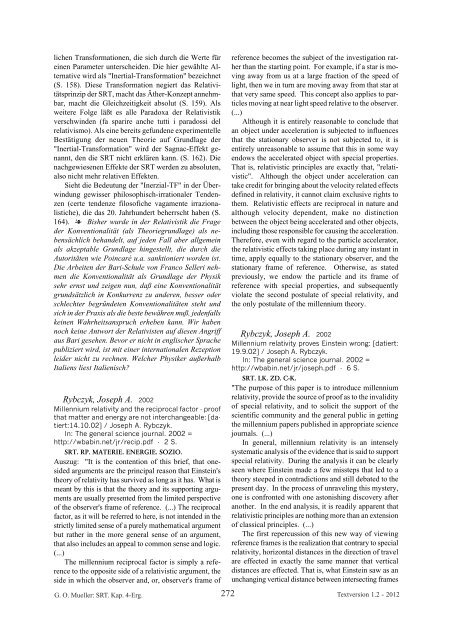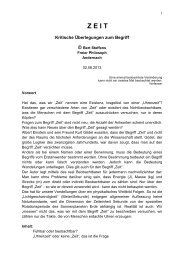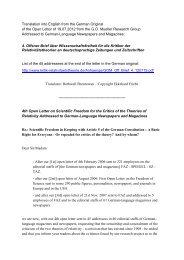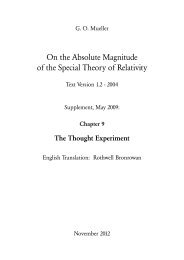2394 weitere kritische Veröffentlichungen - Kritische Stimmen zur ...
2394 weitere kritische Veröffentlichungen - Kritische Stimmen zur ...
2394 weitere kritische Veröffentlichungen - Kritische Stimmen zur ...
Sie wollen auch ein ePaper? Erhöhen Sie die Reichweite Ihrer Titel.
YUMPU macht aus Druck-PDFs automatisch weboptimierte ePaper, die Google liebt.
lichen Transformationen, die sich durch die Werte für<br />
einen Parameter unterscheiden. Die hier gewählte Alternative<br />
wird als "Inertial-Transformation" bezeichnet<br />
(S. 158). Diese Transformation negiert das Relativitätsprinzip<br />
der SRT, macht das Äther-Konzept annehmbar,<br />
macht die Gleichzeitigkeit absolut (S. 159). Als<br />
<strong>weitere</strong> Folge läßt es alle Paradoxa der Relativistik<br />
verschwinden (fa sparire anche tutti i paradossi del<br />
relativismo). Als eine bereits gefundene experimentelle<br />
Bestätigung der neuen Theorie auf Grundlage der<br />
"Inertial-Transformation" wird der Sagnac-Effekt genannt,<br />
den die SRT nicht erklären kann. (S. 162). Die<br />
nachgewiesenen Effekte der SRT werden zu absoluten,<br />
also nicht mehr relativen Effekten.<br />
Sieht die Bedeutung der "Inerzial-TF" in der Überwindung<br />
gewisser philosophisch-irrationaler Tendenzen<br />
(certe tendenze filosofiche vagamente irrazionalistiche),<br />
die das 20. Jahrhundert beherrscht haben (S.<br />
164). � Bisher wurde in der Relativistik die Frage<br />
der Konventionalität (als Theoriegrundlage) als nebensächlich<br />
behandelt, auf jeden Fall aber allgemein<br />
als akzeptable Grundlage hingestellt, die durch die<br />
Autoritäten wie Poincaré u.a. sanktioniert worden ist.<br />
Die Arbeiten der Bari-Schule von Franco Selleri nehmen<br />
die Konventionalität als Grundlage der Physik<br />
sehr ernst und zeigen nun, daß eine Konventionalität<br />
grundsätzlich in Konkurrenz zu anderen, besser oder<br />
schlechter begründeten Konventionalitäten steht und<br />
sich in der Praxis als die beste bewähren muß, jedenfalls<br />
keinen Wahrheitsanspruch erheben kann. Wir haben<br />
noch keine Antwort der Relativisten auf diesen Angriff<br />
aus Bari gesehen. Bevor er nicht in englischer Sprache<br />
publiziert wird, ist mit einer internationalen Rezeption<br />
leider nicht zu rechnen. Welcher Physiker außerhalb<br />
Italiens liest Italienisch?<br />
Rybczyk, Joseph A. 2002<br />
Millennium relativity and the reciprocal factor - proof<br />
that matter and energy are not interchangeable: [datiert:14.10.02]<br />
/ Joseph A. Rybczyk.<br />
In: The general science journal. 2002 =<br />
http://wbabin.net/jr/recip.pdf - 2 S.<br />
SRT. RP. MATERIE. ENERGIE. SOZIO.<br />
Auszug: "It is the contention of this brief, that onesided<br />
arguments are the principal reason that Einstein's<br />
theory of relativity has survived as long as it has. What is<br />
meant by this is that the theory and its supporting arguments<br />
are usually presented from the limited perspective<br />
of the observer's frame of reference. (...) The reciprocal<br />
factor, as it will be referred to here, is not intended in the<br />
strictly limited sense of a purely mathematical argument<br />
but rather in the more general sense of an argument,<br />
that also includes an appeal to common sense and logic.<br />
(...)<br />
The millennium reciprocal factor is simply a reference<br />
to the opposite side of a relativistic argument, the<br />
side in which the observer and, or, observer's frame of<br />
G. O. Mueller: SRT. Kap. 4-Erg.<br />
272<br />
reference becomes the subject of the investigation rather<br />
than the starting point. For example, if a star is moving<br />
away from us at a large fraction of the speed of<br />
light, then we in turn are moving away from that star at<br />
that very same speed. This concept also applies to particles<br />
moving at near light speed relative to the observer.<br />
(...)<br />
Although it is entirely reasonable to conclude that<br />
an object under acceleration is subjected to influences<br />
that the stationary observer is not subjected to, it is<br />
entirely unreasonable to assume that this in some way<br />
endows the accelerated object with special properties.<br />
That is, relativistic principles are exactly that, "relativistic".<br />
Although the object under acceleration can<br />
take credit for bringing about the velocity related effects<br />
defined in relativity, it cannot claim exclusive rights to<br />
them. Relativistic effects are reciprocal in nature and<br />
although velocity dependent, make no distinction<br />
between the object being accelerated and other objects,<br />
including those responsible for causing the acceleration.<br />
Therefore, even with regard to the particle accelerator,<br />
the relativistic effects taking place during any instant in<br />
time, apply equally to the stationary observer, and the<br />
stationary frame of reference. Otherwise, as stated<br />
previously, we endow the particle and its frame of<br />
reference with special properties, and subsequently<br />
violate the second postulate of special relativity, and<br />
the only postulate of the millennium theory.<br />
Rybczyk, Joseph A. 2002<br />
Millennium relativity proves Einstein wrong: [datiert:<br />
19.9.02] / Joseph A. Rybczyk.<br />
In: The general science journal. 2002 =<br />
http://wbabin.net/jr/joseph.pdf - 6 S.<br />
SRT. LK. ZD. C-K.<br />
"The purpose of this paper is to introduce millennium<br />
relativity, provide the source of proof as to the invalidity<br />
of special relativity, and to solicit the support of the<br />
scientific community and the general public in getting<br />
the millennium papers published in appropriate science<br />
journals. (...)<br />
In general, millennium relativity is an intensely<br />
systematic analysis of the evidence that is said to support<br />
special relativity. During the analysis it can be clearly<br />
seen where Einstein made a few missteps that led to a<br />
theory steeped in contradictions and still debated to the<br />
present day. In the process of unraveling this mystery,<br />
one is confronted with one astonishing discovery after<br />
another. In the end analysis, it is readily apparent that<br />
relativistic principles are nothing more than an extension<br />
of classical principles. (...)<br />
The first repercussion of this new way of viewing<br />
reference frames is the realization that contrary to special<br />
relativity, horizontal distances in the direction of travel<br />
are effected in exactly the same manner that vertical<br />
distances are effected. That is, what Einstein saw as an<br />
unchanging vertical distance between intersecting frames<br />
Textversion 1.2 - 2012





